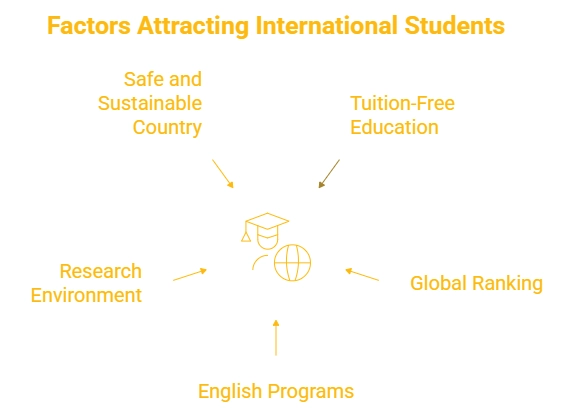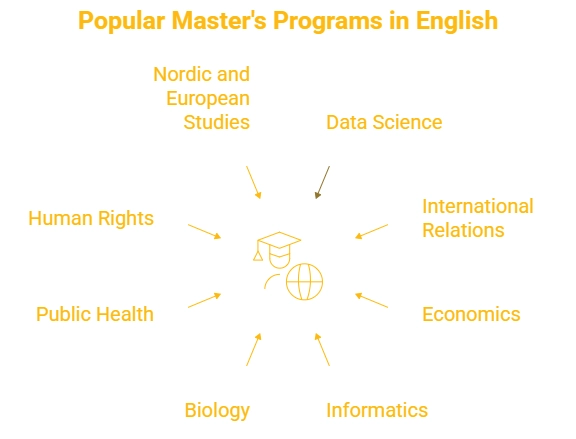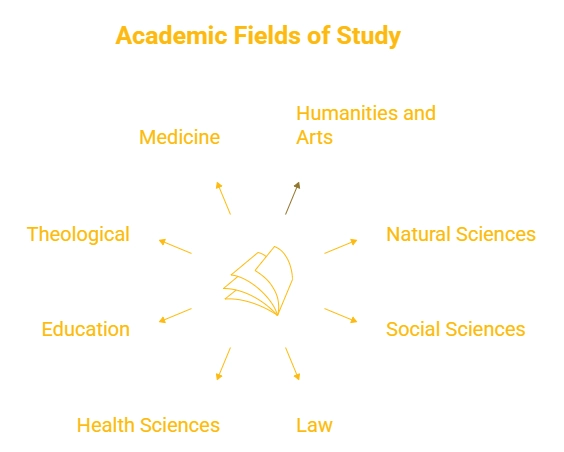Study in Norway
Don't know what to do?
Get Free Counseling
Why apply for University of Oslo?
The oldest and most prominent university in Norway is the University of Oslo (UiO), which is well-known for its cutting-edge research, excellent academic standards, and tuition-free education for students from abroad. Situated in the center of Oslo, Norway's capital, UiO provides a lively and welcoming atmosphere that is perfect for students from other countries.
The University of Oslo stands out as an affordable yet top-notch choice for UK students wishing to study in Europe. UiO offers a distinctive fusion of academic brilliance and cultural diversity with its top-tier faculty, English-taught master's programs in a variety of fields, and access to Norway's excellent standard of living.
- Tuition-free education for international students
- Globally ranked in the top 150 universities
- Wide range of English-taught postgraduate programmes
- Research-oriented academic environment
- Safe, progressive, and sustainable country
*Need assistance to study in Norway? Y-Axis is here to assist you in all the ways.

University of Oslo – Study at Norway’s Top-Ranked University
Looking to study in a research-intensive, globally ranked public university in one of Europe’s most liveable capitals? The University of Oslo (UiO) offers 40+ English-taught master’s programs, world-class research opportunities, and a vibrant international student community in Oslo.
- Founded: 1811 – the first and largest university in Norway.
- Size: Approximately 26,500 students and 7,200 staff members (2024).
- Networks: Active member of the Circle U. European University Alliance and the University of the Arctic (UArctic), fostering international cooperation.
- Academic Strengths: Highly regarded in the humanities, medicine and health sciences, law, natural sciences, and social sciences.
Global Rankings of the University of Oslo
The University of Oslo (UiO) consistently ranks among the world’s top universities and is recognized as Norway’s leading higher education institution. Its strong placement across international ranking systems highlights its excellence in research, teaching, and global collaboration.
| Ranking System | 2025/2026 Position | National Standing |
| Times Higher Education (THE) 2025 | =116 globally | #1 in Norway |
| QS World University Rankings 2026 | 119 globally | #1 in Norway |
| ARWU / Shanghai 2025 | 83 globally | #1 in Norway |
| CWUR 2025 | 87 globally | #1 in Norway |
Subject Strengths: UiO is especially strong in Medicine, Physical and Earth Sciences, Law, Social Sciences, and Education, attracting international recognition and students worldwide.
Programs and Courses at the University of Oslo
The University of Oslo (UiO) offers a wide range of study opportunities for both domestic and international students. While most bachelor’s programs are taught in Norwegian, international applicants typically pursue the English-taught master’s programs, which span across disciplines in science, technology, humanities, law, social sciences, education, and health.
Key Highlights
- English-Taught Degrees: More than 40 master’s programs delivered entirely in English.
- Bachelor’s Studies: Offered primarily in Norwegian, requiring language proficiency for admission.
- Popular Master’s Programs: Data Science, Informatics (AI, Robotics, and Language Technology), Economics, Peace and Conflict Studies, Renewable Energy Systems, Public and International Law, Public Health, and Environmental Sciences.
- Courses in English: UiO provides a broad catalog of individual courses taught in English, particularly valuable for exchange students.
- Exchange Opportunities: Students benefit from international mobility through programs such as Erasmus+ and Circle U., enabling study abroad experiences within partner universities.
Popular Master’s Program taught in English
- Master of Science in Data Science
- Master of Science in International Relations
- Master of Science in Economics
- Master of Science in Informatics: Digital Economics
- Master of Science in Biology
- Master of Science in Public Health
- Master of Science in Human Rights
- Master of Science in Nordic and European Studies

Fields of Study
- Humanities and Arts
- Natural Sciences
- Social Sciences
- The law
- Health Sciences
- Education
- Theological
- Medicine

Courses are generally 2 years long (120 ECTS) and encourage research, interdisciplinary learning, and international exposure.
Admission Requirements at the University of Oslo
The University of Oslo (UiO) has clear criteria for international students applying to its Master’s programmes. The requirements vary depending on academic background and country of origin, but the key standards are outlined below.
| Category | Requirements |
| Academic Eligibility | A completed bachelor’s degree equivalent to a Norwegian bachelor’s degree. Some programmes require specific specializations. |
| English Proficiency | For most Master’s programmes: • TOEFL iBT: minimum total 90 (with section minimums: Reading 19, Listening 20, Speaking 20, Writing 24)• IELTS Academic: overall band 6.5 with no component below 6.5• PTE Academic: overall score 62, with no component below 58 For English-specific programmes (e.g., English Literature, Linguistics, English Studies): • TOEFL iBT: minimum total 108 (with section minimums: Reading 25, Listening 25, Speaking 23, Writing 27)• IELTS Academic: overall band 7.5 with no component below 7.0• PTE Academic: overall score 74, with no component below 65 |
| Required Documents | Transcripts and degree certificates, proof of English proficiency, statement of purpose or CV if required, and any programme-specific documents. Proof of financial ability will also be needed for the student visa. |
Application Deadlines:
- Non-EU/EEA applicants: Applications typically open in October and close around 1 December for the following academic year.
- EU/EEA applicants and residents in Norway: Applications usually open in February with deadlines in March or April, depending on the program.
Note: The University advises applicants to carefully review the specific admission requirements listed on each program’s webpage, as some courses may have additional criteria or earlier submission deadlines.
Tuition Fees and Scholarships at the University of Oslo
The University of Oslo (UiO) has updated its fee policy. Since the academic year 2023/24, students with citizenship from outside the EU/EEA and Switzerland must pay tuition fees, unless exempted. UiO does not offer scholarships for full Bachelor’s or Master’s degree programmes, but exchange students and those in short-term mobility programmes may access funding via external sources. Living costs in Oslo are significant, and students must also pay mandatory semester-related fees.
| Factor | Details |
| Tuition Fees | Non-EU/EEA/Swiss students must pay tuition fees. Exemptions may apply for those with residence permits or strong ties to Norway. |
| Fee Amounts (2025/26) | Fees vary by programme. For example, a 10-credit course costs approximately NOK 23,800–29,300. Full two-year Master’s programmes in technical and science fields may cost around NOK 286,000–295,000 in total. |
| Semester & Registration Fees | All students pay a semester fee to the student welfare organisation (SiO) of NOK 690, plus a Kopinor fee of NOK 220. A voluntary contribution to SAIH of NOK 50 may also be added. |
| Cost of Living | Students are advised to budget a minimum of NOK 14,000 per month to cover housing, food, transport, and other living expenses in Oslo. |
| Scholarships / Funding | UiO does not provide scholarships for full-degree international students. Funding may be available through exchange programmes such as Erasmus+, Erasmus Mundus joint degrees, or through government and private schemes in the student’s home country. |
| Exemptions | Some non-EU/EEA/Swiss students may qualify for tuition fee exemptions if they hold certain residence permits or have other close connections to Norway. |
Available Scholarship and Funding Opportunities
- Exchange Students: Students admitted through programmes such as Erasmus+ or other exchange agreements may receive funding through their home university or the mobility scheme.
- Erasmus Mundus Joint Master’s Degrees: UiO participates in a limited number of Erasmus Mundus joint master’s programmes, which may provide scholarships funded by the EU.
- External Scholarships: Students are encouraged to explore funding opportunities in their home countries, through government grants, private foundations, or international organizations.
- Research Council of Norway: Doctoral candidates and researchers may apply for project-based funding, but this is not a general scholarship for international master’s students.
How to apply for a scholarship?
- UiO Direct Applications: UiO does not have its own scholarship application system for full-degree students. Applicants must secure external funding before applying.
- Exchange & Erasmus Mundus: Students should apply for funding through their home university’s Erasmus office or the Erasmus Mundus consortium running the joint programme.
- Other Sources: Prospective students should research government-funded scholarships, private organizations, or international bodies in their home country that support study abroad.
Campus and Student Life at Oslo University
Studying at the University of Oslo (UiO) means more than world-class academics—it’s about being part of a dynamic and diverse community in one of Europe’s most liveable capitals. The main Blindern campus, located in central Oslo, is the heart of student life, offering modern lecture halls, research facilities, libraries, and collaborative study spaces.
Key Highlights:
- Campus Location: The Blindern campus provides a central hub for learning, research, and student interaction, surrounded by Oslo’s cultural and natural attractions.
- Housing: Degree and exchange students have access to affordable SiO student housing across Oslo. Early application is essential, as accommodation is allocated on a first-come basis. Private housing is also an option for those seeking independent living.
- Student Welfare and Services: The SiO Student Welfare Organization supports students with healthcare, counselling, sports facilities, fitness centres, and dining services, ensuring a well-rounded student experience.
- Community & Activities: UiO is home to numerous student organizations, cultural associations, and international clubs, offering opportunities for socializing, networking, and leadership development.
- Global Community: With thousands of international students enrolled each year, UiO fosters an inclusive, multicultural environment where students can build lifelong friendships and professional networks.
The University of Oslo offers the perfect balance of academic excellence and vibrant student life, making it a top choice for students seeking both high-quality education and a rich cultural experience in Norway.
Why Choose the University of Oslo?
Choosing the University of Oslo (UiO) means joining one of Europe’s most respected research universities, consistently ranked as Norway’s best. With a strong international focus and excellent career opportunities, UiO offers far more than just academics.
- Norway’s Top University: UiO is ranked among the world’s top 120 universities and holds the #1 position in Norway across leading global rankings (THE, QS, ARWU).
- World-Class Research: A leading institution in medicine, natural sciences, law, social sciences, and humanities, UiO attracts researchers and students from around the globe.
- International Collaboration: As a member of Circle U. European University Alliance and UArctic, UiO provides students with exchange opportunities and access to global academic networks.
- Focus on Sustainability: UiO emphasizes environmental research, green initiatives, and sustainable practices on campus, preparing students for the global green transition.
- Career Opportunities: Studying in Norway’s capital opens pathways to career prospects both in Norway and across the EU, with international graduates eligible for post-study work opportunities.
Note: The University of Oslo offers a unique combination of academic prestige, international engagement, and a supportive environment that equips students for global success.
Admission Selectivity at the University of Oslo
The University of Oslo (UiO) does not publish official acceptance rates for its programmes. However, admission is considered competitive, particularly for popular English-taught Master’s degrees that attract thousands of applications from around the world.
What Influences Admission:
Your likelihood of admission depends on how well you meet the programme’s stated criteria. Key factors include:
- Academic Qualifications: A strong undergraduate degree with the required specialization and grades.
- English Language Proficiency: Meeting or exceeding test requirements such as IELTS, TOEFL, or equivalent.
- Programme-Specific Requirements: Some courses may ask for a motivation letter, CV, or portfolio.
- Application Quality: Clear, complete, and well-presented documents submitted before the deadline.
Typical Required Documents:
- Degree certificates and official transcripts
- Proof of English language proficiency
- Motivation Letter or Statement of Purpose (for specific programmes)
- Updated CV or résumé
- Passport copy
- Letters of Recommendation (required by some programmes)
While some external sources suggest acceptance rates for international students may be in the low double digits, UiO does not confirm such figures. The best way to assess your chances is to carefully review the official requirements of your chosen programme and ensure your application is as strong as possible.
How Can Y-Axis Help you?
Y-Axis provides end-to-end guidance for students aspiring to study at the University of Oslo and other top institutions in Norway. Our expert team supports you at every stage of your study abroad journey.
Our Services Include:
- Admission Support: Assistance with university shortlisting, document preparation, and meeting application deadlines.
- Visa Guidance: Step-by-step support for securing your Norway study visa, including documentation and interview preparation.
- Scholarship & Funding Assistance: Guidance on available funding opportunities and help with scholarship applications.
- Post-Study Career Pathways: Advice on work opportunities in Norway and the EU, including post-study work permits and career planning.
Frequently Asked Questions
